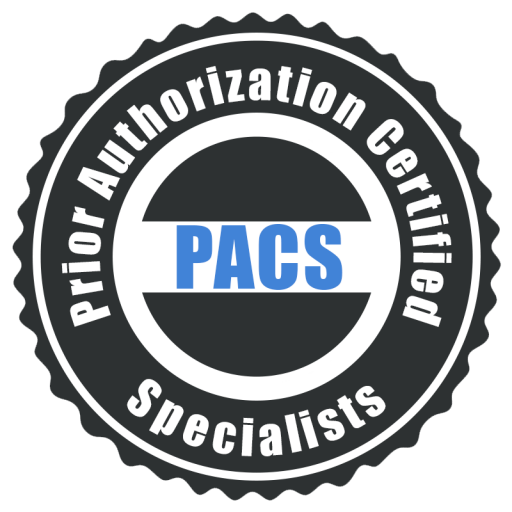PACS PROGRAM INFORMATION
The Prior Authorization Certified Specialist (PACS) program is a comprehensive, 12-module, self-paced, online program designed to foster the professional development of the Prior Authorization Specialist. The Prior Authorization Certification demonstrates that professionals have met rigorous standards through intensive study, self-assessment and evaluation.
The PACS certification is the most comprehensive training program in the world. Achieving the PACS demonstrates the highest standards of knowledge, and excellence in the prior authorization field.
It also sets the stage for continual professional development through values centered on lifelong learning. The curriculum serves to provide intermediate level material which is meant to establish a minimum level of core competencies we believe are important for all prior authorization professionals.
The curriculum focuses on 5 key areas:
I. Prior authorizations including definitions, history and the evolution of the prior authorization process, defining the roles of the prior authorization professionals, understanding the complete process from provider through payer to patient
II. Fundamentals before the prior authorization including medical compendia, ICD- 10 codes, CPT and the medically accepted indication
III. Insurance guidelines, researching the plan effectively, communication and initiating a prior authorization request from the provider’s office
IV. Coverage Determinations of the medication prior authorizations and processing the request from the payer’s side
V. Authorization denials and appeals and other authorization needs and tasks.
Program Goals
Program Learning Outcomes
Program Format
The PACS program is online and self-paced. Individuals are given access to all program materials for six months.
The program consists of 12 modules. Each module contains a post-quiz, goals and learning objectives. The post-quizzes are meant as progress indicators. The program also includes case studies, and a glossary of terms and a tool kit.
Time needed to complete: It's a self-paced program, but on average most learners complete the program within 4 weeks (approximately 10 hours)
*Learners have 6 months to complete the certification

